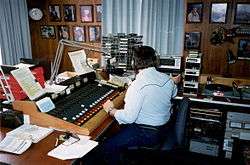Radio personality

A radio personality is a person who has an on-air position in radio broadcasting. A radio personality hosts a radio show is also known as a radio host and in India and Pakistan as a radio jockey.
Description
A radio personality can be someone who introduces and discusses genres of music; hosts a talk radio show that may take calls from listeners; interviews celebrities or guests; or gives news, weather, sports, or traffic information. The radio personality may broadcast live or use voice-tracking techniques.[1]
Increasingly, radio personalities are expected to supplement their on-air work by posting information online, such as on a blog. This may be either to generate additional revenue or connect with listeners.[2]
With the exception of small or rural radio stations, most of what you hear on the radio now is a computer-controlled playlist airing .mp3 audio files. These audio files are the source of the songs you hear, the commercials, and half the time even the radio announcer himself has pre-recorded a "break". Essentially, most radio stations are PC's playing audio files and broadcasting the signal on-air.
History
The radio personality dates back to 1909 when Ray Newby of California made his debut for Herrold College of Engineering and Wireless.[3] By 1910, radio personalities were active across the United States.[4]
FM/AM radio
FM/AM personalities play music, talk, or both.[5] Examples are Opie and Anthony, Howard Stern, Elvis Duran, Big Boy, Kidd Kraddick, John Boy and Billy, The Bob and Tom Show, and Rickey Smiley.
Talk radio
Talk radio personalities often discuss social and political issues from a particular political point of view.[5] Some examples are Rush Limbaugh, Art Bell, George Noory, Brian Kilmeade, Brian Lehrer, and John Gibson.
Sports talk radio
Sports talk radio personalities are often former athletes, sports writers, or television anchors and discuss sports news.[5] Some examples are Dan Patrick, Tony Kornheiser, Colin Cowherd, Mike Francesa and Chris Russo.
Satellite radio
Satellite radio personalities are not subject to government broadcast regulations and are allowed to play explicit music.[5]
Salary in the US
Radio personality salaries are influenced by years of experience and education. The median salary of a radio personality in the US is $28,400.
- 1–4 years: $15,200-39,400,
- 5–9 years: $20,600-41,700,
- 10–19 years: $23,200-51,200,
- 20 or more years: $26,300-73,000.
A radio personality with a bachelor's degree has a salary range of $19,600-60,400.[6]
The salary of a local radio personality will differ from a national radio personality. National personality pay can be in the millions because of the increased audience size and corporate sponsorship. For example, Limbaugh makes $40 million annually as part of the eight-year $400 million contract he signed with Clear Channel Communications.[7]
Career opportunities
Due to a radio personality's vocal training, opportunity to expand their career often exist. Over time a radio personality could be paid to do voice overs for commercials, television shows, and movies.[8]
Training
Universities offer classes in radio broadcasting and have a radio station, where a student obtain on-the-job training and course credit.[9] Prospective radio personalities can also intern at radio stations for hands-on training from professionals. Training courses are also available online.[9]
Education
Some radio personalities do not have a formal education, but many hold degrees in audio engineering.[10] Radio personality typically have a bachelor's in radio-television-film, mass communications, journalism, or English.[11]
Job requirements
A radio personality position generally has the following requirements:[12][13]
- Good clear voice with excellent tone and modulation
- Great communication skills and creativity to interact with listeners
- Knowledgeable on current affairs and social trends
- Thinking outside the box
- Ability to develop their own style
- A good sense of humor
See also
References
- ↑ L. A. Heberlein - The Rough Guide to Internet Radio 2002 - Page v. "In addition to putting songs together, a good radio host can tell you things you didn't know about the artists, the songs, and the times."
- ↑ Rooke, Barry; Odame, Helen Hambly (2013). ""I Have to Blog a Blog Too?" Radio Jocks and Online Blogging". Journal of Radio & Audio Media 20 (1): 35. doi:10.1080/19376529.2013.777342.
- ↑ Bein, K (Fall 2009). "So You Want to Be a DJ?". Interactive Media Lab, College of Journalism and Communications, University of Florida. Retrieved 5 March 2013.
- ↑ Schneider, John. "The History of KQW and KCBS San Francisco/San Jose". The Bay Area Radio Museum. Bay Area Radio Museum. Retrieved 28 February 2013.
- 1 2 3 4 "Radio and Television Job Description". CareerPlanner.com. Retrieved 28 February 2013.
- ↑ "Disc Jockey (DJ), Radio Salary, Average Salaries". Payscale.com. Retrieved 22 March 2013.
- ↑ "Rush Limbaugh Net Worth". celebritynetworth.com. Retrieved 28 February 2013.
- ↑ "Radio Jockey: Job Prospects & Career Options". webindia123.com. Retrieved 28 February 2013.
- 1 2 "ASU Dept. of Radio-TV". Arkansas State University. Retrieved 5 March 2013.
- ↑ "Radio Jockey Education and Job requirements". educationrequirements.org. Retrieved 12 March 2013.
- ↑ "Announcers". bls.gov. 8 January 2014.
- ↑ "Radio Jockey education and job requirements". educationrequirements.org. Retrieved 12 March 2013.
- ↑ "RJs Talk About Their Careers in Radio". YouCareer.in. 1 September 2013. Retrieved 28 October 2015.